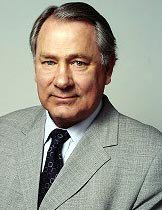


Frederik Van Zyl Slabbert was born on 2 March 1940 at Pretoria. He
matriculated from Pietersburg Afrikaans Hoërskool in 1958 and studied at the
Universities of Witwatersrand (first year) and Stellenbosch:
Greek, Latin, Hebrew and Sociology (BA 1961, BA Hons. (cum laude) 1962, MA
(cum laude) 1964, and D.Phil 1967).
He was the first resident head of Majuba men's residence.
He lectured Sociology at the universities of Stellenbosch, Rhodes, Cape Town
and Wits and was appointed professor in 1973.
After 10 academic years he went into politics for 12 years.
"Slabbert dropped a bombshell on SA politics when, in 1986, he resigned from parliament because it had, in his view, become irrelevant. He began a career in commerce by lecturing at the Wits Business School and engaged in political consultancy. In 1987, he made the historic journey to Dakar, Senegal, with a group of mainly Afrikaners when 10 days of talks were held with the then banned ANC. This followed the forming, with Alex Boraine, of IDASA ( Institute for a Democratic Alternative for SA)." (Sunday Times)He was a director of IDASA and also a regional facilitator through the George Soros-backed funding organisation, Open Society Foundation of Southern Africa, which identifies and backs worthy projects in nine African countries.
He worked as a political analyst and businessman.
Frederik was married to Jane from Swaziland and had two grown up children, Tania and Riko, from his first marriage.
Frederik Van Zyl Slabbert died on 14 May 2010.
Hobbies: walking, talking and reading
"One thing the 'old' and 'new' South Africa have in common is a passion for inventing history. History is not seen as a dispassionate inquiry into what happened, but rather as part of political mobilisation promoting some form of collective self-interest. Not for one second do I pretend to know the 'whole' or 'real' story of what happened in the old South Africa, or what is happening in the 'new'. I know that significant parts of what has been, or is being invented, are not the way I experienced them. This is a personal reflection on a fascinating period in my life which coincided with fundamental shifts in the political life of South Africa. I was fortunate to be in a position where I knew and had access to persons of influence across the political spectrum. This is my account of their interaction with each other and mine with them." Frederik van Zyl Slabbert